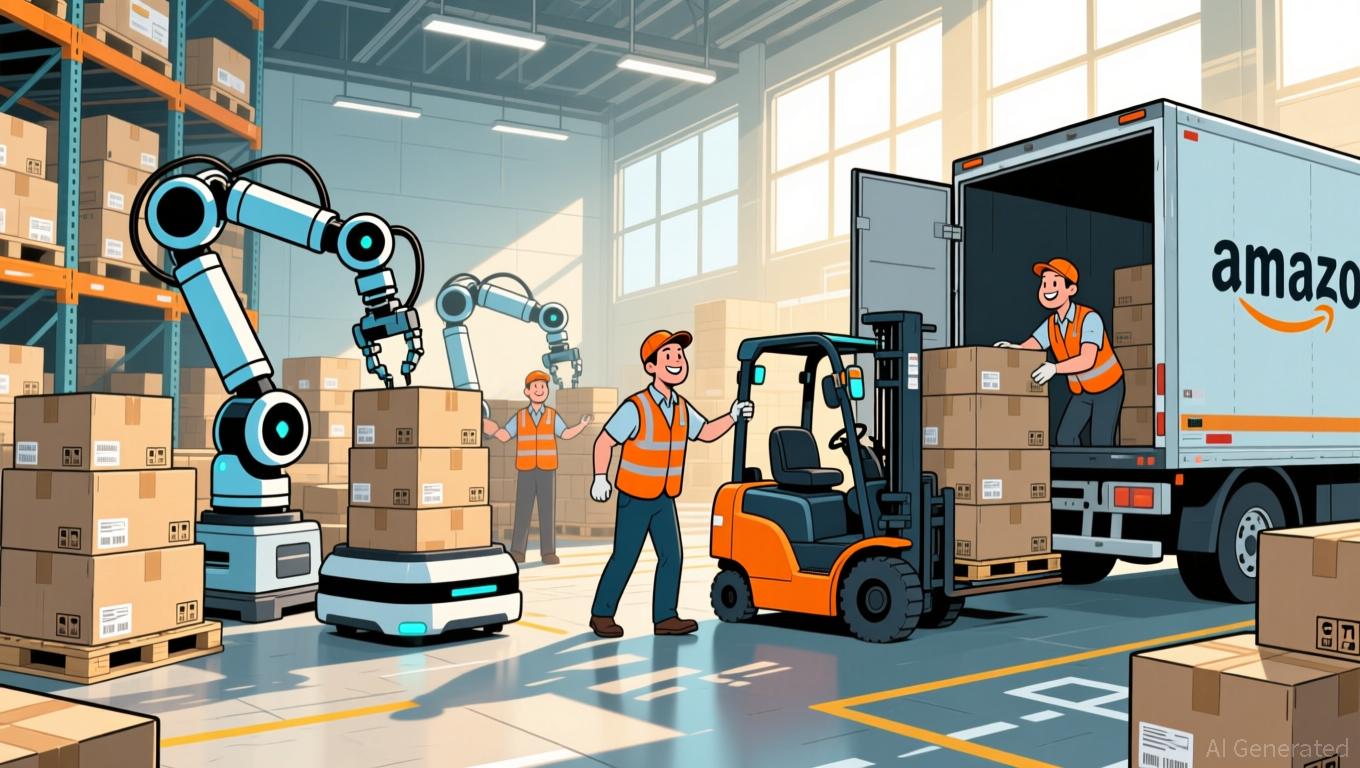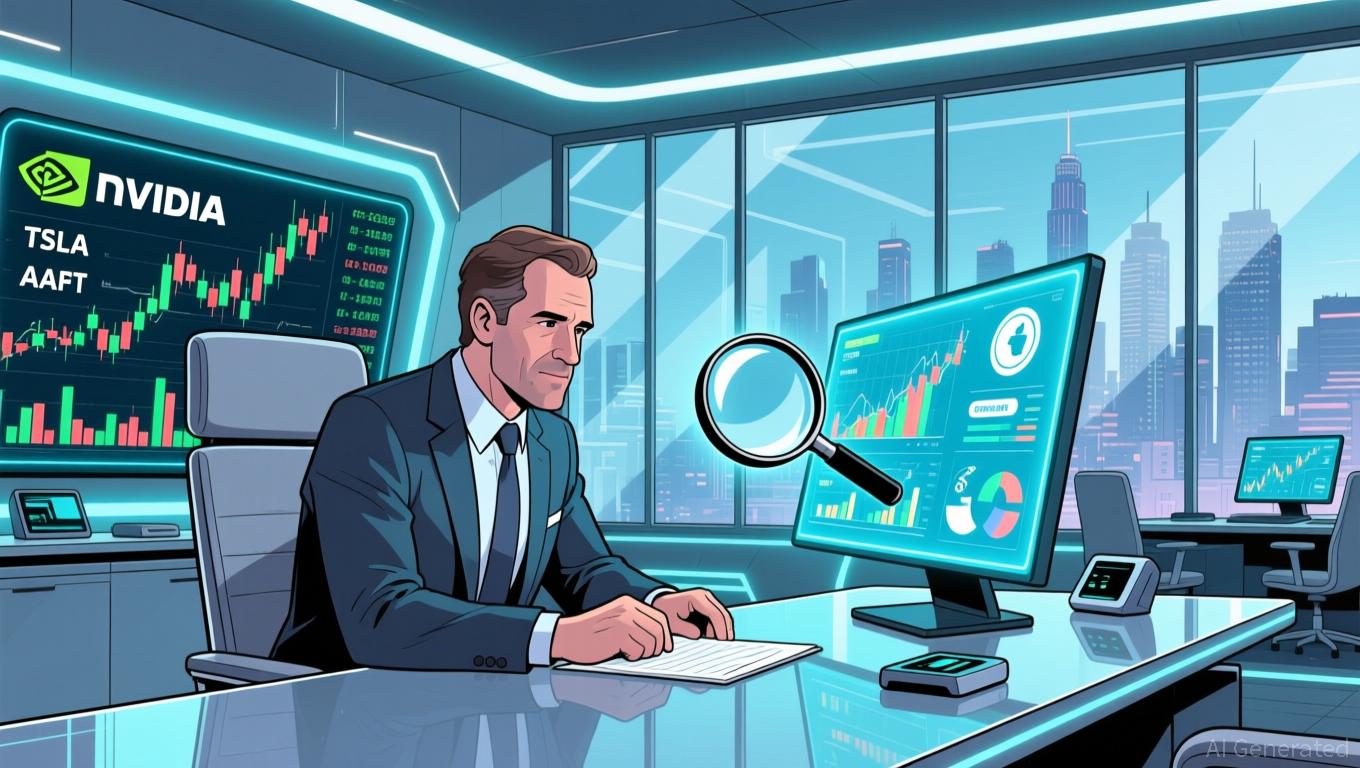Amazon's growing use of AI and recent job cuts spark concerns among employees about job security
- Amazon announced 14,000 corporate layoffs (2025) and a $50B AI infrastructure investment, targeting engineers and white-collar roles to prioritize automation-driven efficiency. - Leaked plans reveal 75% warehouse automation could displace 600,000 jobs, sparking concerns about blue-collar worker displacement despite claims of "extending human capacity." - The $2.5B upskilling initiative aims to prepare 50 million workers for AI-driven shifts, yet critics question if reskilling can offset massive job losse
Amazon’s unprecedented layoff of 14,000 corporate employees and its $50 billion commitment to AI infrastructure have sparked renewed discussions about how automation will reshape employment. The job cuts, which mainly impacted engineers and other white-collar professionals,
Announced in October 2025, these layoffs represent the largest workforce reduction in Amazon’s 31-year history. Nearly 40% of the 4,700 U.S. jobs eliminated were engineering positions
Meanwhile, Amazon Web Services (AWS)

The growing divide between Amazon’s AI-driven goals and its workforce changes is further illustrated by leaked documents indicating plans to automate 75% of warehouse tasks,
The consequences go beyond Amazon itself. As AI becomes more prevalent, companies from Microsoft to Northrop Grumman are wrestling with how to integrate automation while maintaining job stability. Steve O’Bryan of Northrop, for example, expects European defense budgets to remain high even after the Ukraine war, as countries rebuild their arsenals. Likewise, Amazon’s $2.5 billion reskilling program is designed to prepare 50 million people for the evolving job market, though some doubt these initiatives can truly counteract the scale of job loss.
Currently, Amazon’s approach—simultaneously reducing its workforce and investing in AI—mirrors a broader movement in the tech industry. As Bloomberg observes, major tech firms are increasingly focused on speed and efficiency, even as they face growing criticism over the social costs of technological advancement.
Disclaimer: The content of this article solely reflects the author's opinion and does not represent the platform in any capacity. This article is not intended to serve as a reference for making investment decisions.
You may also like
TradFi Develops Blockchain Foundations, Transforming International Financial Systems
- Traditional banks like Standard Chartered and Citi expand crypto custody services, partnering with firms like 21Shares to integrate digital assets into core infrastructure. - Strategic moves include Standard Chartered consolidating custody under its parent bank and Citi enhancing fiat-stablecoin transaction capabilities with Coinbase . - Regulatory developments, such as Japan's proposed reserve rules for exchanges , and $4.65B Q3 2025 crypto VC funding highlight sector maturation and institutional adopti

Zodia Faces an Unclear Path as Standard Chartered Moves Forward with Traditional Finance Crypto Custody
- Standard Chartered partners with 21Shares to offer crypto custody, signaling TradFi's deeper integration into digital assets. - Zodia Custody's uncertain future highlights competitive pressures as crypto-native custodians face challenges from traditional banks. - Legal risks and a credit downgrade complicate Standard Chartered's crypto expansion amid regulatory shifts like Japan's asset segregation rules. - Industry trends show traditional banks leveraging reputation and compliance to compete with crypto

Trump’s ACA Subsidy Proposal Weighs Financial Relief Against Concerns Over Fraud in a Delicate Political Balance
- Trump proposes extending ACA subsidies for two years, raising eligibility to 700% FPL and ending zero-premium plans to combat fraud. - The plan faces bipartisan challenges, with Senate voting in mid-December and House Republicans favoring alternative cost-cutting measures. - Analysts warn premium hikes could destabilize ACA markets, risking coverage for 22 million Americans amid partisan gridlock.
Thiel Turns to Major Defensive Tech Firms Amid Growing Concerns Over AI Bubble
- Peter Thiel's Q3 2025 portfolio reshuffling saw full exit from Nvidia and reduced Tesla holdings , shifting funds to Apple and Microsoft amid AI valuation concerns. - The $166M from sales was partially reinvested into Apple and Microsoft, leaving over $120M in cash reserves, signaling a defensive strategy shift. - Nvidia's 0.33% premarket dip and mixed market reactions highlight institutional sentiment shifts, with analysts debating Thiel's caution versus potential miscalculation. - Thiel's track record
